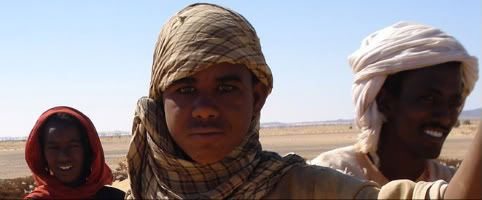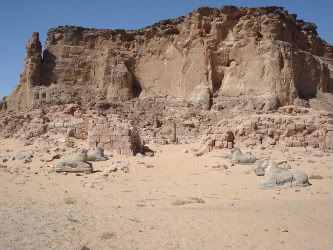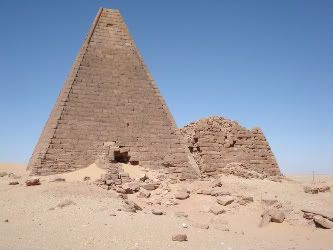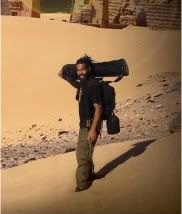All Posts (6515)
Now that Wiscon 33 is over, I'm now free to announce that next year, Mary Anne Mohanraj (a writer, editor, and spec-fic community activist) and I will be the Guests of Honor at Wiscon 34 (if you don't know what Wiscon is, it describes itself as the "World's Leading Feminist Science Fiction Convention"...and it IS!  . Learn more here).
. Learn more here).
I’m both honored and ecstatic. When it was announced at the ceremony on Sunday, there was an enormous applause. That really warmed my heart and almost made me teary-eyed (and that is so unlike me...I don't do public tears). It was truly a beautiful thing.
I hope to see you all there next year.
Nnedi
Penelope and Otto discuss all things social and sexual including...

Should judges be so concerned about what female attorneys wear? The new JFK tell-all by reputed paramour who gets near 7-figure book deal; Dick Cheney - More weapons of mass distraction; Terminator Salvation - Did you see it? What do you think? Errett Thomas discusses "Personal Responsibility". This and more on this installment of In Like Flynn.
by Louis Buckley (Director, Producer, Editor and Narrator)
were indigenous to Africa and that they were Africans, but how did it all start?

"Nubian Spirit" is a beautifully shot documentary which unravels the fascinating and often magical legacy of Ancient Sudan. It shines light onto the Ancient African culture, history and spiritual mythology of the people from the Nile Valley.

www.FirstWorldBooks.com
The film digs deep into Ancient Africa's numerous contributions to modern civilization. It draws out the reality of such disciplines as astronomy, architecture, science and much more that the Ancient Africans used to make sense of their world.
The film features dynamic interviews with leading scholars Robin Walker, K.N Chimbiri, Anthony Browder, Ife Piankhi, Onyeka, Dr. Kimani Nehusi, Rashid El Shelkh, an archaeologist and ground breaking museum curators Stephen Quirke and Sally-Ann Ashton.
The revelations and information they contribute help the viewer to fully "over-stand" this important time period. These perspectives are seldom, if ever, taught in mainstream schools or universities.
It has been well recorded that the first humans on the planet emerged from the beautiful continent of Africa. However most people today know little about how these African cultures have influenced modern society. We understand the importance of sharing authentic African history in a balanced way and how under represented it is in the western world view. We wish to contribute to setting the balance straight by accurately representing the facts and the information we discover.
The natural resources of Africa and the thousands of years of developed African culture have played an important part in the development of human culture throughout the world. Together the land and its people have made their knowledge and expertise available on a universal scale in areas such as religion, medicine, agriculture, arts, technology, architecture, astrology, music, mathematics, science, dance, mining and the list goes on. Alongside all of this, it is clear that countless numbers of African lives, their strength, blood, sweat, tears and service have been used as a source of human labour to literally build, establish and protect the cities and wealth in the western world. This seems to still remain largely unknown and unacknowledged in main stream thought, education and media.

This is a wonderful educational tool for both children and adults alike who have a genuine thirst for knowledge about the amazing continent of Africa and the world's earliest civilizations that emerged from it.

- International Black Welsh Film Festival
An epic love story, dynastic feuds, foreign invasion, and mythology. Sounds like the perfect ingredients for a Hollywood blockbuster, but Nubian Spirit tells the real and often untold story of Ancient Africa and the people that inhabited it. Filmed, produced and directed by Louis Buckley, this independent filmmaker manages to bolt together an award-winning documentary that brings to light the rich culture and history of the people from the Nile Valley.
Navigating through a map of Ancient Africa, Nubian Spirit reveals the journey of people across the continent, culminating in the creation of a diverse but powerful civilization. Meanwhile, bold, panoramic cinematography captures a time when men and woman ruled side by side. Highlighting many of captivating stories, Nubian Spirit delves into legends such as Osiris, the God of the after-life and his wife Isis, goddess of magic and life, revealing a history as fertile and long as the river in its title.
Buckley employs the help of several experts - all obviously passionate about the subject - to piece together the story of a golden era that gave birth to science, astrology, architecture, and much more. But it's not all about mythological figures straight out of a dusty history book. Nubian Spirit explores the connections between this forgotten time and the way we live today.
Let’s face it: history can make us all glaze over at the best of times but this legacy is told with such vigour that it leaves you with a thirst to know more. Of course it also helps that this snapshot of history comes in a digestible portion of just 1hr 15mins. Use Nubian Spirit to brush up on the history and significance of Ancient Africa...beyond pyramids and pharaohs.
- Corinne O'Sullivan
Louis Buckley is director, producer, editor and narrator of the amazing film, Nubian Spirit. Louis Buckley is of Jamaican and African descent born in London who had long dreamed of visiting the land from which his ancestors had come. In his documentary he traces the roots of African civilization.
Louis Buckley is founder of BlackNine Films in 2004 which is a team of individuals with a diverse range of skills and talents who are motivated to produce documentary films. Their aim is to promote a more rounded view of some of the world's accepted history by highlighting some of the forgotten stories from indigenous African cultures around the world. Through film, they bring to light the hidden and neglected contributions these cultures have made to help shape our world as it is today. Their plan is to introduce more real cultural understanding, whilst showing the impact African culture has had on modern society.
They are, generally, of the view that this information has either been distorted or remains largely unacknowledged in western societies through ignorance and unbelief and, therefore, the African contribution is not adequately understood, appreciated or represented. It is our desire to celebrate human culture and share the lessons of the past so we may gain greater understanding of our present.
World history informs us that Nations continually rise and fall, we think its important to observe these historical changes now so that the human family can move towards a mutually respectful and harmonious future.
The story, the art, the music are all his own and they are all absolutely awesome- and I'd say that even if he weren’t my brother.
 . I highly suggest you watch it back to back (part 1 and then immediatly part 2) in the HD mode. It's about 18 mintues long all together.
. I highly suggest you watch it back to back (part 1 and then immediatly part 2) in the HD mode. It's about 18 mintues long all together.Enjoy...
Part 1
PART 2

